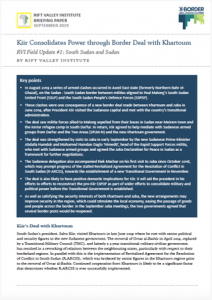Key Points
-
In August 2019 a series of armed clashes occurred in Aweil East state (formerly Northern Bahr el- Ghazal), on the Sudan – South Sudan border between militias aligned to Paul Malong’s South Sudan United Front (SSUF) and the South Sudan People’s Defence Forces (SSPDF).
-
These clashes were one consequence of a new border deal made between Khartoum and Juba in June 2019, after President Kiir visited the Sudanese capital and met with the country’s transitional administration.
-
The deal saw militia forces allied to Malong expelled from their bases in Sudan near Meiram town and the Kerior refugee camp in South Darfur. In return, Kiir agreed to help mediate with Sudanese armed groups from Darfur and the Two Areas (SPLM-N) and the new Khartoum government.
-
The deal was strengthened by visits to Juba in early September by the new Sudanese Prime Minister Abdalla Hamdok and Mohamed Hamdan Daglo ‘Himedti’, head of the Rapid Support Forces militia, who met with Sudanese armed groups and agreed the Juba Declaration for Peace in Sudan as a framework for further negotiations.
-
The Sudanese delegation also accompanied Riek Machar on his first visit to Juba since October 2018, which may prompt progress of the stalled Revitalised Agreement for the Resolution of Conflict in South Sudan (R-ARCSS), towards the establishment of a new Transitional Government in November.
-
The deal is also likely to have positive domestic implications for Kiir. It will aid the president in his efforts to efforts to reconstruct the pro-Kiir SSPDF as part of wider efforts to consolidate military and political power before the Transitional Government is established.
-
As well as satisfying the security interests of both Khartoum and Juba, the new arrangements may improve security in the region, which could stimulate the local economy, easing the passage of goods and people across the border. In the September Juba meetings, the two governments agreed that several border posts would be reopened.
This briefing is a product of the X-Border Local Research Network, a component of DFID’s Cross- Border Conflict—Evidence, Policy and Trends (XCEPT) programme, funded by UKaid from the UK government. The programme carries out research work to better understand the causes and impacts of conflict in border areas and their international dimensions. It supports more effective policymaking and development programming and builds the skills of local partners.



